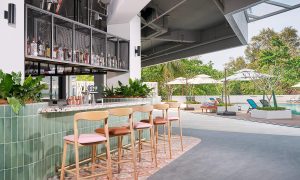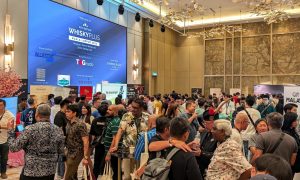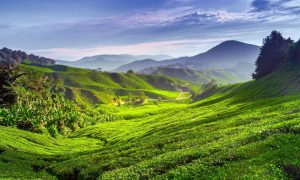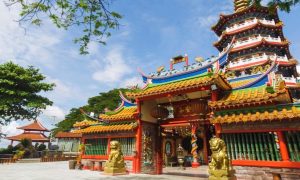This post is written by Bryan Wawzenek. Photos by Lisa Robidoux.
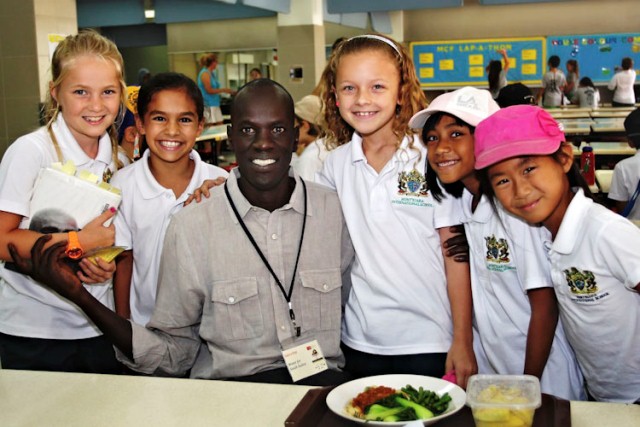
With perseverance and a heart for humanity, one person can make an enormous impact. In part one of a two-part feature, writer Bryan Wawzenek shares the amazing tale of just such a person, a Sudanese man whose life story served to rally and inspire an entire community of students and teachers right here in Malaysia.
Two fourth-graders are walking down the hallway, on a break from class, on their way to the water fountain. They round the corner and freeze. Their heads tilt up. Their eyes grow big. In hushed excitement, one blurts to the other, “There he is,” as if her friend could have possibly missed the tall, slender African man strolling through the corridor. You know, the guy whose face is on posters plastered all over Mont Kiara International School (MKIS). The man who made the trip to Kuala Lumpur, Malaysia, to speak at assemblies and interact with classrooms of students.
“Hey guys,” he smiles as he passes by.
“How’s it going?”
All they can muster is a nervous, “Goood,” their voices trailing up, as if they’re asking for approval. They explode into giggles behind him. He looks over his shoulder and laughs, too.
You would think that the students had just encountered a celebrity. In a way, they had. While Salva Dut is not a sports hero or a pop star, he has become known for his incredible story as a Sudanese “lost boy” and for founding a charity, Water for South Sudan, to help the people of his home country. He is at MKIS to inspire students to take action in their lives.
Persecution and Perseverance
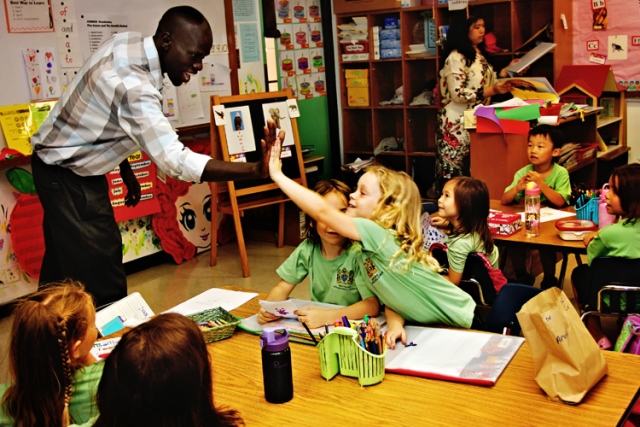
Salva Dut grew up in war-torn Sudan as a member of the Dinka tribe. When he was 11 years old, he was forced into exile by the country’s second civil war. Millions died in the prolonged conflict and millions of others, like Salva, walked for months through the desert, looking for safety. He persevered as others fell prey to animal attacks and the unforgiving elements. Along the way, he lost his uncle and his friend. He spent the next decade living under desperate conditions at refugee camps in Ethiopia and Kenya.
“In the camps, you don’t have a right to exercise your own way of life,” Salva said. “So many people who are not in good health. Lots of disease. [We were asking] ‘When will peace come to Sudan and we can go back home?’”
At the age of 21, Salva was allowed asylum in the U.S. and adopted by a family in Rochester, New York. A few years later, he was told that his father was still alive and Salva was able to make the journey back to Sudan to visit him. During his trip, he learned of the great need for clean water in his father’s village and was inspired to raise money to build a well there. He founded a charity named Water for Sudan. (The name was later changed to Water for South Sudan after the region voted to become its own nation.) Since 2003, one well has become 177, serving about 400,000 South Sudanese residents – including Salva, who has returned to build a life with his wife and two daughters in his home country.
A Long Walk, A Lavish Flight
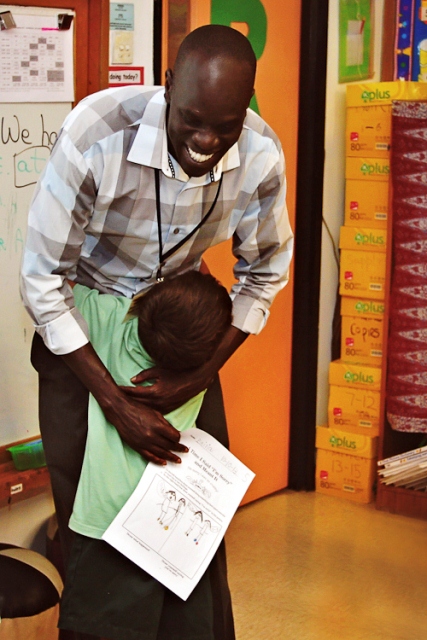
In 2010, Salva’s story was the inspiration for Linda Sue Park’s short novel, A Long Walk to Water, a book that sixthgrade students at MKIS read each year. Sixth-grade language arts teacher Steve Sostak, often credited by students and teachers as the “architect” of Salva’s visit to MKIS, said the idea to bring Salva and the students closer together began at a November 2012 GIN (Global Issues Network) conference of middle school students and teachers in Singapore.
“Near the end of the conference, we were asked to meet as a school GIN group and develop ‘I will’ statements on how to follow our passions and change our behaviors in respect to finding solutions to global issues,” Sostak said. “It was then that the students and I decided that we would unify our ‘I will’ statements into a ‘We will host a local GIN conference.’ We began brainstorming keynote speakers during that session and Salva was agreed upon as a target due to our closeness to and feelings about A Long Walk to Water.’”
Salva agreed to travel to MKIS, where it turned out that he would do much more than just give a keynote address at a Saturday GINsanity conference. From 9-14 October 2013, he would participate in nearly a week full of events which would include every MKIS student (from three-year-old KP children to high school seniors), as well as faculty and parents. The cost of Salva’s transportation to KL would have likely made the visit prohibitively expensive, but Malaysia Airlines stepped in and covered the entire journey, flying Salva in first class from Uganda to KL and back. The generosity shown by Malaysia Airlines allowed the GIN Club at MKIS to raise money that, instead of going towards travel costs, went to the Water for South Sudan charity for a new well, bringing a great sense of personal involvement to the students at MKIS.
“I have been longing for some type of community activity that could rally our spirit and unite us behind a common vision,” Sostak said. “I also have felt that a sustainable or global issues theme was something that the entire community would value. When Salva agreed to come, I felt that this was the perfect opportunity to act on this potential vision and hope that his incredible life and his gentle soul could bring us together under the theme of hope and perseverance.”
Inspired to Act
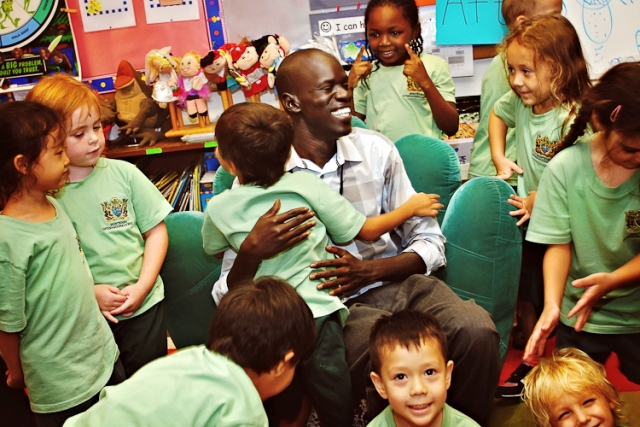
Hope and perseverance are the common threads that run through every interaction between MKIS students and Salva. These range from assemblies where Salva tells high school students, via slide-show, about the results of Water for South Sudan’s wells, to Q&A sessions in grade three classrooms to meetings with a handful of middle school dance students. For these few days, Salva is everywhere in the school and talking about anything – in a language, English, that he didn’t learn until he was an adult. He walks into a Grade 10 world affairs class and speaks to the political issues surrounding the African countries that get water from the Nile River. “I’m talking to you because you will be the leaders,” he begins. “We may have a war over water in the next years. Who knows?”
He talks about his wells, which cost between $5,000 and $15,000 U.S. to construct, and the political controversies he must carefully sidestep when building them. He speaks clearly, although he has a pronounced accent, and gracefully gesticulates to enhance his points. He holds a water table in his arms, divides regions with his hands and counts out wells on his long fingers.
In an IB geography class, Salva talks about the long-range effects of clean water in South Sudan, including gender equality – something he’s eager to discuss with any age group. “Now having a well is helping the community. We have a big problem in Africa, always putting the women down,” he says, eyebrows raised in concern. He explains that it is traditionally the girl’s role to fetch water, which can sometimes take the whole day. But, with a well in the village, the girls can attend school instead.
“Education is the key to solving the gender issues,” he says. “Once the girls are educated, they grow up and don’t allow their kids to be abused. This is not a simple problem. It will take a generation to solve it.”
Salva discusses challenges and the importance of goals with grade six language arts students, the ones who’ve just read A Long Walk to Water. He talks about his journey across the Akobo Desert, which he made when he was the same age as these kids, and how he had goals to “just make it to that tree, or just make it to that hill” and it kept him going all the way to the Ethiopian refugee camp. The students share their goals, some of which are about sports or video games while others involve family relationships, academic pursuits and even preventing deforestation.
“Those are great goals,” Salva reacts, nodding his head. “But reaching your goals is not easy, guys. You need to have hope. You need to persevere no matter what happens. You might not want to do your homework now, but without it, are you going to become a doctor, an engineer? Your goals aren’t just for you. They help other people and the community and society.”
A Memorable Meeting

When Salva’s time is up, the session ends with a chorus of disappointed “awwws.” It quickly turns to excitement when the students are told they can take a class picture with their guest. Most want to shake his hand. Some get autographs. Others try to conceal tears, overcome by the emotion of meeting Salva.
“Well, think about it this way: they’re meeting the main character from a book they’ve read,” says Ryan Kopf, MKIS assistant curriculum coordinator and the man tasked with getting Salva to the right locations during his visit. “If we brought in any character from a book that they’ve all read, and love, it would be this kind of reaction.”
As Kopf explains this, Salva is being mobbed by a group who are eager to say hi and get an autograph during lunchtime. Many people would be startled by the sea of students, but Salva smiles and laughs, looking just a bit embarrassed by the attention. Every day he’s at MKIS, he’s given the chance to eat alone and take a break, but he always chooses to eat with the kids.
In a way, this Salva-mania provides a buoyant contrast to many of the hardships he discusses over and over every day: his uncle dying, walking for two months, surviving refugee camps, dealing with culture shock in America. There are many unpleasant memories that, in some way, Salva must have compartmentalized to be able to talk about them so rationally and honestly, again and again.
Be sure to look for part two of this inspirational story.To learn more about Salva’s foundation, Water for South Sudan, please visit the excellent website, www.waterforsouthsudan.org
Source: The Expat December 2013
Read more:
- The Difficulties and Issues Faced in Trusting Someone New
- The Malaysian Culture Group: Honouring Heritage and Looking to the Future
- Quirky Malaysia
What are your thoughts on this article? Let us know by commenting below.No registration needed.







